A digital dark age? The people rescuing forgotten knowledge trapped on old floppy disks
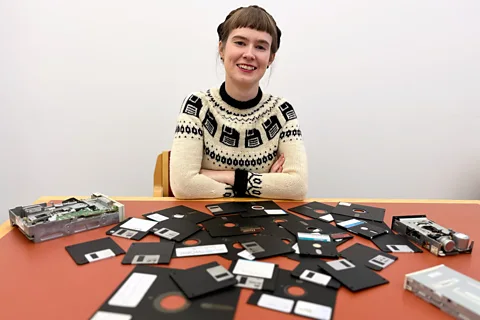 Cambridge University Library
Cambridge University LibraryFrom lectures by Stephen Hawking to the letters of British politician Neil Kinnock – it's a race against time to save the historical treasures locked away on old floppy disks.
Some of the world's most treasured documents can be found deep in the archives of Cambridge University Library. There are letters from Sir Isaac Newton, notebooks belonging to Charles Darwin, rare Islamic texts and the Nash Papyrus – fragments of a sheet from 200BC containing the Ten Commandments written in Hebrew.
These rare, and often unique, manuscripts are safely stored in climate-controlled environments while staff tenderly care for them to prevent the delicate pages from crumbling and ink from flaking away.
But when the library received 113 boxes of papers and mementoes from the office of physicist Stephen Hawking, it found itself with an unusual challenge. Tucked alongside the letters, photographs and thousands of pages relating to Hawking's work on theoretical physics, were items now not commonly seen in modern offices – floppy disks.
They were the result of Hawking's early adoption of the personal computer, which he was able to use despite having a form of motor neurone disease known as amyotrophic lateral sclerosis, thanks to modifications and software. Locked inside these disks could be all kinds of forgotten information or previously unknown insights into the scientists' life. The archivists' minds boggled.
These disks are now part of a project at Cambridge University Library to rescue hidden knowledge trapped on floppy disks. The Future Nostalgia project reflects a larger trend in the information flooding into archives and libraries around the world.
"Most of the donations we get are from people who are either retiring or passing away," explains Leontien Talboom, a member of the library's digital preservation team who is leading the project. "That means we're seeing more and more things from the era of personal computing."
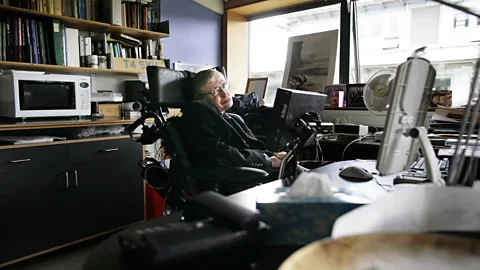 Getty Images
Getty ImagesAt first, the durable plastic of floppy disks, popular from the 1970s to the 1990s, may seem more secure than fragile manuscripts. Paper rots, ink fades and runs. Synthetic materials can last much longer – that is, after all, why plastic pollution is such a concern. But the digital information saved inside these rigid cassettes is more vulnerable than you might think. The iron oxide that coats the thin layer of plastic inside can degrade and lose its magnetism over time. This means the data could be lost forever.
Legacy data storage devices like floppy disks therefore present serious complications for archivists. "If you've got a book, it doesn't matter how old it is – you can still read it," Talboom says (provided you understand the language it is written in, of course). With floppy disks, however, you need specialised equipment just to access the content itself – it is like requiring a key to open a book. Even then you might not be able to read what is inside. "You need to know a lot about the systems where these floppy disks were formatted too," says Talboom.
This has created concerns among archivists, historians and archaeologists that future generations may face a sort of "digital dark age" when they look back for material from the past 50 years or so. Much like the Dark Ages of Europe that followed the collapse of the Roman Empire, it's not that nothing happened. But if no records from the time exist, then it will be impossible to know what people thought, felt and how they lived.
To address this challenge, the Future Nostalgia project is trying to piece together bits of ancient computer hardware to read rare and unusual floppy disks. Even when they have the hardware, the team must laboriously determine how disks were formatted so they can read them correctly. Talboom has also found herself delicately teasing mould off the flimsy surface of the magnetic disks to avoid scratching them.
"If people have kept them in garages or lofts, they can get mouldy," she says.
The content she has recovered so far offers a tantalising insight into the diverse array of material out there. In the Cambridge University Library alone, she's processed floppy disks containing everything from writings and abstract lists by the poet Nicholas Moore to articles from a society of the paranormal. But the Hawking disks remain her favourite. "I was honoured to work on them," Talboom says.
The library received Hawking's disks along with other material from his office through the Acceptance in Lieu scheme, which allows important historical objects and archives to be made available to the public. Alongside the papers, letters and printouts was quite a lot of digital material, says Talboom.
The Hawking disks arrived in two batches. The first were 5.25-inch disks from a DOS-formatted computer. "Basically early Windows," Talboom explains. "It's quite difficult to date floppy disks as people used systems for quite a while," she continues. But these first disks are believed to be the earlier set in the collection. Much of the content is still being researched, but Talboom reveals that the disks contain letters written by Hawking.
Talboom also revealed that they had also found games on some of Hawking's disks – perhaps a glimpse of the scientists' famous light-hearted side.
The second batch is made up of the more common 3.5-inch disks. These seem to date from a later period and are associated with an early Mac computer. "They're mainly lectures," Talboom says. "From a technical point of view, they're really interesting because his lectures were so huge he had to split them over multiple floppy disks."
Hawking was known to write speeches and save them to disk so that he could deliver them through his voice synthesiser at a later time. Hawking's digital files may also contain folders of plain text files on a wide range of issues that were important to the physicist, allowing him to select sections to be sent to the speech synthesiser during conversation or in response to questions. At least some of the disks also contain software used by the scientist.
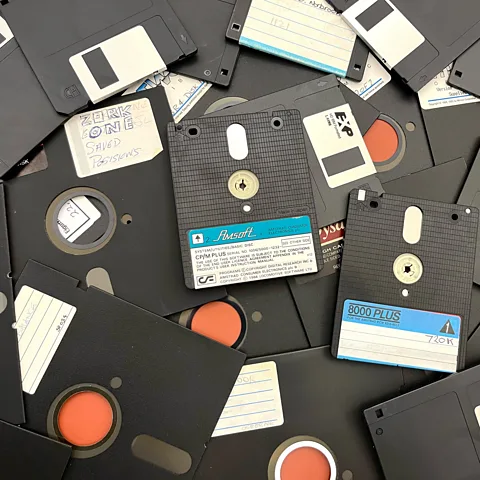 Cambridge University Library
Cambridge University LibraryThe differences in disk size and software needed to access the Hawking material is typical of the early floppy disk era. "There wasn't one system that dominated the market," Talboom explains. "It was a bit of a wild west out there." For archivists today, that means dozens of separate machines are needed to read disks of various sizes from different systems. And it often takes significant searching to track down these ancient devices – everywhere from house clearance auctions to collector marketplaces.
"I bought my eight-inch drive off eBay," says Chris Knowles, a participant in the Future Nostalgia project. "It was a miracle that it worked." Knowles is using the drive to extract content from almost 200 eight-inch floppy disks for the Churchill Archives Centre. "Those are the oldest format in our collections," Knowles says of the difficult eight-inch disks, which were once owned by Neil Kinnock, leader of the Labour Party in the UK between 1983 and 1992. "At first, we thought the disks just contained speeches, which we already had in other formats. But in doing our tests, we've proved that at least some of it is correspondence with his constituents."
On this occasion, Knowles got lucky to track down a working drive for a rare disk format. But Talboom believes it will only get harder to find the equipment needed to unlock the data trapped on floppy disks. "This stuff is not going to last forever," she says. "Ten years ago, it would have been easier. But a lot of it is disappearing."
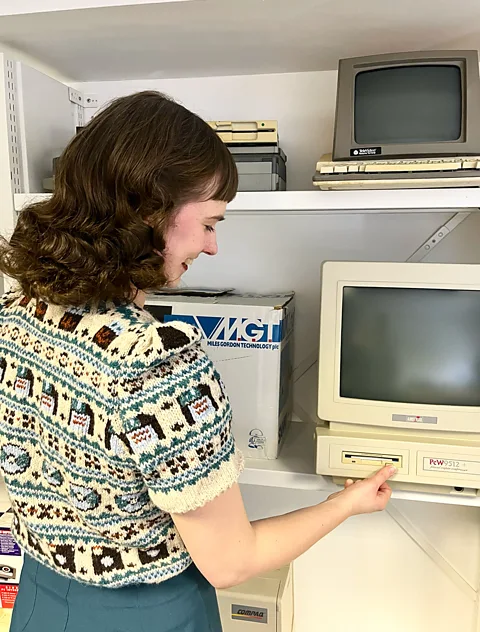 Cambridge University Library
Cambridge University LibraryAmong the disks discovered in the Cambridge University Library collections are peculiar three-inch floppy disks, which were popular in the UK for a short while before being eclipsed by the 3.5-inch disks that became the standard size.
"They're more challenging because the drives are harder to acquire," says Talboom. "They've got a different voltage system. So there's all these kind of quirks that need to be done to get them to work." Eventually Talboom and her colleagues had to source a specific disk drive made by Amstrad, build new connectors and jerry-rig a power cable to access the disks.
More like this:
- Obsolete, but not gone: The people who won't give up floppy disks
- The 3,000-year-old story hidden in the @ sign
- Why people are hunting down old TVs
It's not just the hardware that is becoming scarcer. Information on floppy disk software is disappearing too. "A lot of the people who worked on these systems have either retired or they've passed away," Talboom explains. "So that knowledge is starting to be lost."
The Neil Kinnock disks are a case in point. "The materials were very hard to get into," Knowles explains. "They were written on the Diamond Word processor. There's not much information about that system out there. There are lots of fan communities around any system that had games, and archivists often borrow their tools. But where that doesn't exist, it's more awkward."
That means even if data can be extracted from a floppy disk, there is often significant work needed to make it readable on a modern device. Peter Rees, an archivist at the Cambridge History of Innovation Project, likens the process to a form of translation. "Philologists go to the ancient Latin and translate it into a text we can read in the present," he says. "That's what the Future Nostalgia project is doing with this illegible code. We have to use technical apparatus to decipher it and then make it readable."
This stage is often the most difficult. That's why some data the Future Nostalgia project has recovered from floppy disks is not yet available to researchers. "With the Stephen Hawking materials, the next part of the process is access," Talboom says. The difficulty of running old software on modern devices means "it's quite challenging to make them properly accessible to users", she adds.
Knowles notes that for archivists working with archaic software, the process of using modern tools can change the look or feel of the original material slightly. "We try to minimise how much we change things," he says.
For now, Talboom believes the most critical work is simply extracting and saving the data from floppy disks – before it's too late. "Many floppy disks are 40 or 50 years old," she says. "The magnetic material they’re written on is starting to degrade. So we have to save them as quickly as possible."
As well as this technical work for the archivist community, Talboom is also involving the public in her quest to save the forgotten information trapped on floppy disks. On 9 October 2025, she hosted a floppy disk workshop at Cambridge University Library where members of the public could bring old disks they had at home to see what contents are locked inside.
For Knowles, it makes perfect sense for the public to get involved in preserving floppy disks. "There’s clearly a very large interest in family history," he says. "So this is a way for people to recover things that they thought were lost – to learn from what members of their family stored away."
Rees hopes it might also be possible to unearth some more work by scientists from Cambridge and beyond. "Old emails and work calendars might not seem like historical documents," he says. "They may even seem banal. But that's how Newton or Darwin's letters would have seemed 200 years ago. Now they're fascinating resources that give us a window into the past."
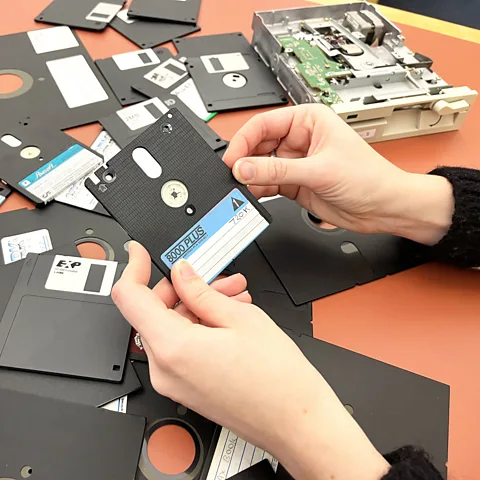 Cambridge University Library
Cambridge University LibraryAs for Talboom, she's especially interested in seeing any 5.25-inch disks – one of the earlier floppy formats and her personal favourite. "Floppy disks were really expensive at that time," she explains. "People would reuse them and overwrite them. So, with a 5.25-inch, you never know what you're going to get. The label can say one thing, but something else could be inside."
That mystery is part of the appeal of working with floppy disks. "If you receive an archive of paper material, there's probably someone who flipped through the pages," Talboom says. "But with floppy disks, they just get handed over to us. I find it fascinating that someone put a floppy disk away 40 years ago and I'm the first one seeing it again. It feels like discovering something."
In an era where digital information is easily accessible anywhere in the world, Rees agrees that there's something special about working with floppy disks containing software and information that has lain dormant for decades. "You might think things haven't changed much from 30 or 40 years ago," he says. "But floppy disks show us just how alien the past is. We have a better memory thanks to floppy disks."
--
For more technology news and insights, sign up to our Tech Decoded newsletter, while The Essential List delivers a handpicked selection of features and insights to your inbox twice a week.
For more science, technology, environment and health stories from the BBC, follow us on Facebook and Instagram.
